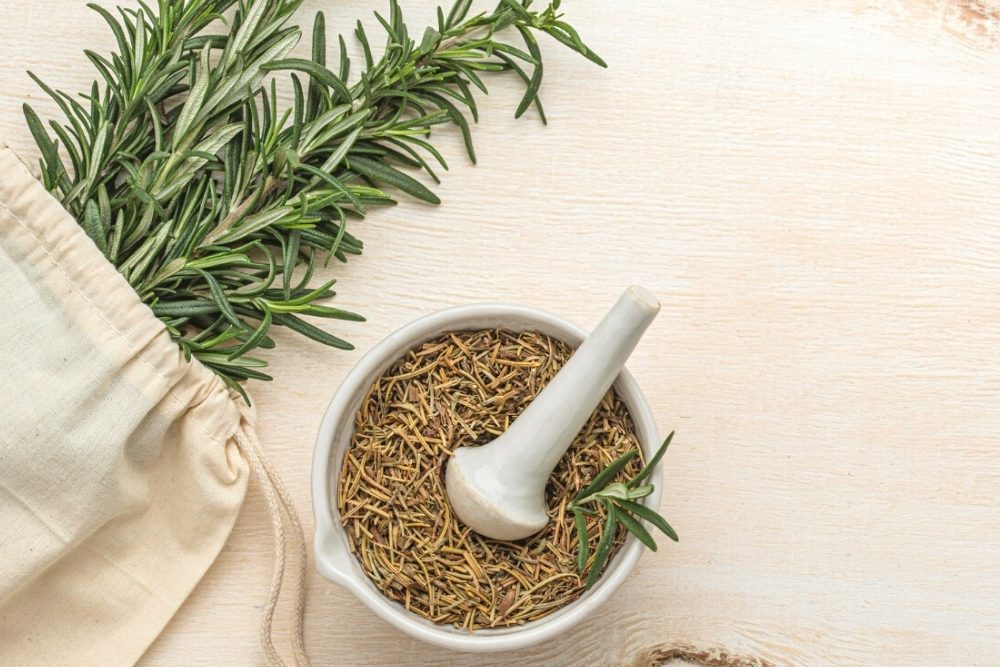Rosemary (Salvia rosmarinus) is a fragrant herb that has many practical uses and medicinal benefits. In botanical medicine, rosemary has been used to reduce inflammation, boost mental focus, and help lower stress. In the garden, growing rosemary can help to keep away deer and rodents. In the kitchen, rosemary is well known for lending a warm, bitter flavor and aroma to a wide variety of foods.
Rosemary contains antioxidants, antibacterial and anti-inflammatory compounds that are thought to help boost the immune system and improve circulation. Among the nutrients found in rosemary are vitamins A, C, B6, iron, and calcium.
When used medicinally, dried rosemary leaves can be made into powder for use in capsules or tea. Rosemary can also be extracted to create an essential oil or a liquid extract (tincture). Some of the many uses of rosemary for health enhancement include:
- Aromatherapy with rosemary essential oil is useful for enhancing mood, memory, and focus.
- Essential oil of rosemary is useful to stimulate the scalp to help reduce dandruff. *(Not the same as rosemary-infused cooking oil).
- Rosemary in both tea and capsule form have been used to alleviate digestive distress such as heartburn, gas, and constipation.
- Tinctures prepared with rosemary have been used to combat bacterial infections, including staph infections. In lab analysis, the antioxidants in rosemary have been shown to protect cells from damage that is caused by free radicals (the byproducts of molecular processes in the body that are linked to many chronic illnesses).
There is ongoing research to better understand the extent of the beneficial effects that rosemary has on health. Though generally considered safe for most people to use, there are a few precautions to take with rosemary–particularly the oil which should only be used topically and must be diluted. If you take other medicines, rosemary can interact and change the way those medicines work in your body. Check with your holistic health practitioner before using rosemary for a medical condition or health concern.
Resources
SFGate.com. “Herbs that Deter Bugs and Animals from a Garden.” https://homeguides.sfgate.com/herbs-deter-bugs-animals-45868.html
Angioni, A., et al. “Chemical composition, plant genetic differences, antimicrobial and antifungal activity investigation of the essential oil of Rosmarinus officinalis.” L. J Agric Food Chem. 2004;52(11):3530-3535. https://pubmed.ncbi.nlm.nih.gov/15161226/
Atsumi, T., Tonosaki, K. “Smelling lavender and rosemary increases free radical scavenging activity and decreases cortisol level in saliva.” Psychiatry Res. 2007;150(1):89-96. https://pubmed.ncbi.nlm.nih.gov/17291597/
Cheung, S., Tai, J. “Anti-proliferative and antioxidant properties of rosemary Rosmarinus officinalis.” Oncol Rep. 2007;17(6):1525-1531. https://pubmed.ncbi.nlm.nih.gov/17487414/
Martinez-Tome, M., et al. “Antioxidant properties of Mediterranean spices compared with common food additives.” J Food Prot. 2001;64(9):1412-1419. https://pubmed.ncbi.nlm.nih.gov/11563520/
McCaffrey, R., Thomas, D.J., Kinzelman, A.O. “The effects of lavender and rosemary essential oils on test-taking anxiety among graduate nursing students.” Holist Nurs Pract. 2009;23(2):88-93. https://pubmed.ncbi.nlm.nih.gov/19258850/

